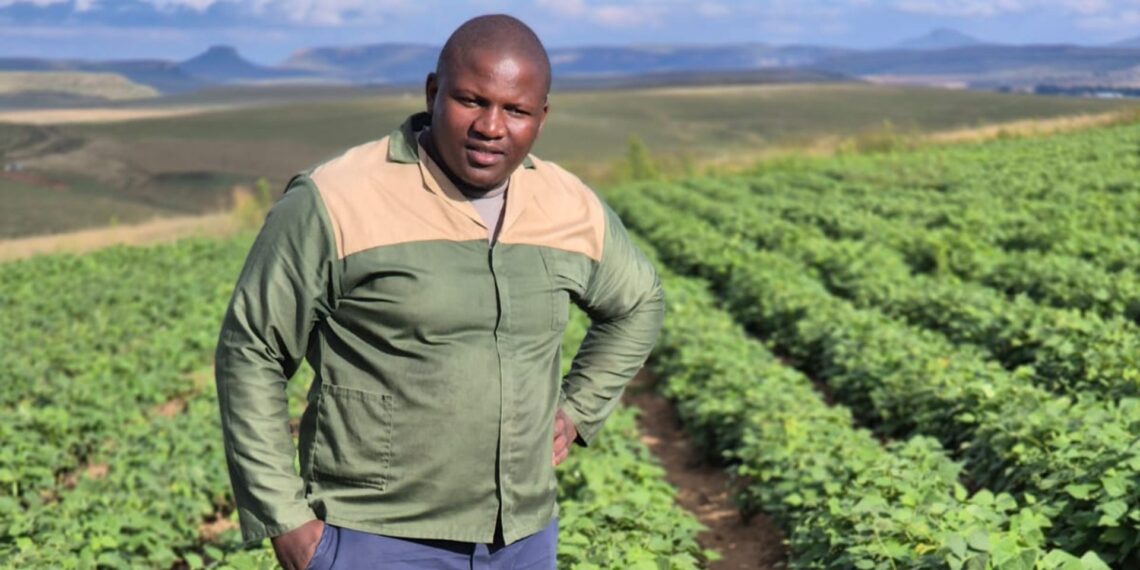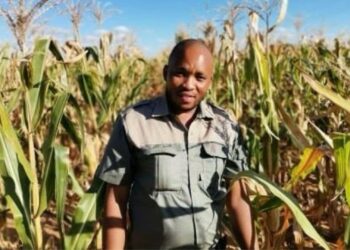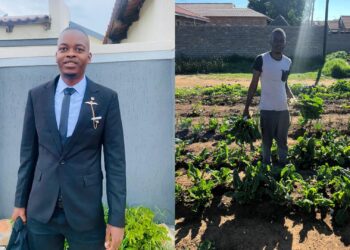Qenehelo Mavuso, affectionately known as Vusos, is a determined farmer whose journey into agriculture began in the most unassuming of places: his grandfather’s garden. There he discovered the promise of potato farming, and there was no turning back.
“I remember in 2013 when we visited our grandfather. He had planted potatoes in his small garden. My brother and I saw an opportunity; those potatoes were a money crop,” he recalls.
Although born in the Eastern Cape, Mavuso now farms in the Free State, where he leads a dynamic agricultural cooperative. His venture, MCV Cooperative, began in 2015 with his brother, Cornelius Mavus, on communal land allocated by the local chief.
“The chief gave us 50 hectares of communal land,” he explains.
With no fertilisers or chemicals, they planted potatoes, and to their surprise, the crop thrived. The success of that first harvest opened doors to supermarket markets and set their farming journey in motion.
Scaling up through partnerships
What began as a modest communal plot grew significantly. “We increased our production to 10 hectares and planted dry beans on the remaining 40 hectares,” Mavuso says.
Support from the department of agriculture, rural development and land reform played a crucial role in expanding their capabilities. Soon, they began renting additional land to increase production.
Related stories
- TikTok trailblazer: Botswana’s Mosa farms, leads, and inspires
- Maditsi’s high school hustle becomes promising poultry venture
- Legacy lives on: Mathidi finds purpose in potato farming
Today, Mavuso and his team operate a 374-hectare farm, with 180 hectares suitable for cultivation. “Right now, we only have 50 hectares of dry beans and 20 hectares of potatoes because of delays in funding. We had to plant something at least, so we can pay,” he explains.
A major turning point came when Potatoes South Africa brought Mavuso’s MCV Cooperative into its Enterprise Development Programme. “Potatoes South Africa has played a huge role in our growth,” he says.

“Through their programme, we’ve received mentorship, technical support, and guidance on how to meet commercial standards. They helped us move from small-scale to structured production.”
Training on appropriate varieties, planting techniques, and market requirements allowed the team to elevate both the quality of their crops and their access to commercial markets.
Diversifying for long-term sustainability
Aware of the need for a steady income, Mavuso and his team have diversified their operation. With help from the Small Enterprise Development and Finance Agency (Sefda), the cooperative now runs an egg production unit of 5 000 layers, housed in an automated facility on a rented farm. The eggs are sold through an established commercial contract, ensuring reliable cash flow.
Their livestock venture, supported by Land Bank funding, includes 210 sheep, four rams, 15 cows, and 15 calves. While this part of the business currently operates informally, Mavuso is exploring partnerships with local abattoirs to formalise and grow its impact.
Farming wasn’t always the plan. Mavuso trained as a nurse, and his family history is deeply rooted in agriculture. “My father was born on the farms, but he never went back. He worked in the mines,” he says.
“What drives me is passion. We farmers love our job. Remember, we are feeding the nation,” he says. Still, the pull of his former profession sometimes lingers. “Sometimes when you’re on the farm, you think, ‘Maybe I should go back to nursing.’ But it’s not that simple. You just have to do what needs to be done.”
Overcoming obstacles in a tough sector
Mavuso is candid about the struggles he’s faced. “Challenges are always there. When we started, our biggest hurdle was funding. It doesn’t matter how much you produce; if there’s no funding, you’re stuck.”
Land ownership was another significant obstacle.
“If you don’t own land, it’s hard. You can’t invest in someone else’s property.”
Instead of waiting on government redistribution, Mavuso and the cooperative members adopted a proactive approach by taking out a loan to secure land access, ensuring that their farming ambitions would not be delayed by red tape or long queues.
Climate change has also tested the team’s resilience. “There’s drought, and then there’s too much rain. But those are things we can’t control. As farmers, we work against nature sometimes.”
MCV Cooperative creates employment in the surrounding community. It now employs five permanent staff members, along with livestock handlers and seasonal workers.
“Today I have 60 people harvesting potatoes and beans,” he shares with pride.
Aiming for new horizons
Despite managing a sizable and complex operation, Mavuso remains modest. “We want to see ourselves as commercial farmers. I’m not a commercial farmer yet.”
His plans are ambitious and strategic. He aims to expand potato production to 100 hectares and scale up dry bean farming. The egg production unit is also set for growth, with plans for more automated facilities. Securing long-term land tenure or ownership is a top priority to ensure sustainability.
Mavuso also envisions on-site packaging and branding of potatoes, adding value and increasing margins. In livestock, he’s determined to break into formal markets and enhance his breeding programmes.
“I want to venture into big production. It’s nice when you’re chasing the money, but it’s even better when the money starts chasing you,” he laughs.
To aspiring young farmers, Mavuso offers a heartfelt message. Many people, he says, admire successful farmers without understanding the struggles behind their achievements.
“You have to put in the work. You have to start, no matter where you are or what you have. We started with just half a hectare and our own money. You have to make a plan and get started,” he advises.






READ NEXT: Agriculture sector to confront climate crisis at key summit

















